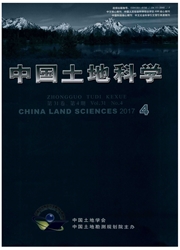

 中文摘要:
中文摘要:
研究目的:基于经济发展阶段理论,对1987-2011年中国大陆31个省份进行经济发展阶段划分,采用计量工具分析经济增长、城市人口增加、产业结构调整及固定资产投资对城市用地扩张的影响,为城市用地扩张差别化调控提供决策支持。研究方法:统计与计量分析法,对比分析法。研究结果:随着经济发展阶段的推进,城市用地扩张速度不断加快;在传统经济发展阶段,城市人口增加对城市用地扩张影响最大,而固定资产投资对其无显著影响;在工业化初期,固定资产投资及经济增长成为主导因素,城市人口增长对城市用地扩张的影响力下降;在全面工业化阶段,经济增长成为城市用地扩张的首要驱动力,而固定资产投资则变为影响最小的负向作用因子。研究结论:不同经济发展阶段城市用地扩张驱动因素及其作用强度及效果有所不同,为引导城市用地合理扩张,需把握各地区所处经济发展阶段及其城市用地扩张主导驱动力,制定差别化城市用地扩展管制政策。
 英文摘要:
英文摘要:
In-depth study on the driving mechanism of urban land expansion at different economic development stages is helpful to differentially regulate urban land sprawl. Based on the theory of economic development stage, this paper firstly analyzed the economic development phase of 31 provinces and municipalities in Mainland China from 1987 to 2011,and the panel data samples were selected in different economic development stages. Then, effects of economic growth (represented by GDP per capita), urban population, adjustment of industry mix, investment in fixed assets on urban land expansion were analyzed by using Panel data econometric method in different stages. Results indicate that at the stage of traditional economic development, urban population increase has the greatest impact on urban land expansion, while the influence of investment in fixed assets is not significant. However, at the early stage of economic development, the investment in fixed assets and economic growth became the primary important factors, and the impact of urban population increase declined. And at the stage of overall industrialization, economic growth became the most important factor, while the investment in fixed assets becomes the weakest negative effect factor. This study confirms that urban land expansion is affected by different driving factors, and the influence intensity and direction of the same driving factor are also different at each stage of economic development. In order to make a reasonable regulation on urban land expansion in China, the differentiated land policies should be established by grasping the dominant driving forces at different stages of economic development.
 同期刊论文项目
同期刊论文项目
 同项目期刊论文
同项目期刊论文
 期刊信息
期刊信息
